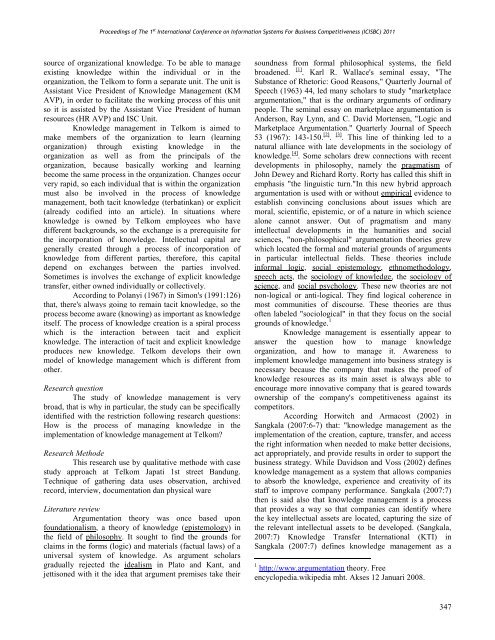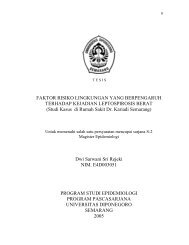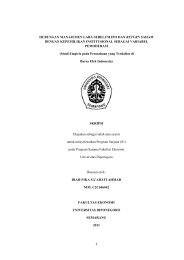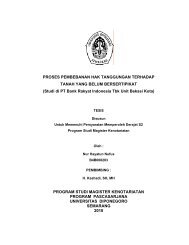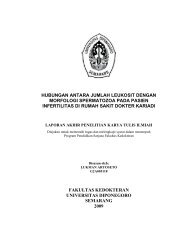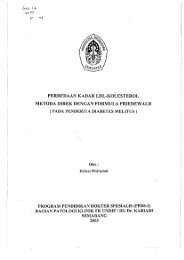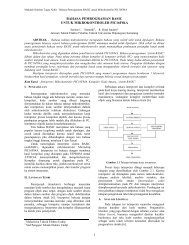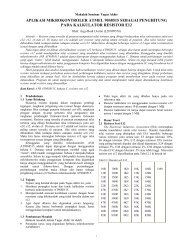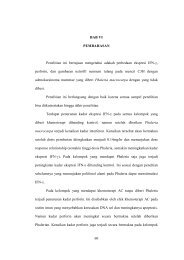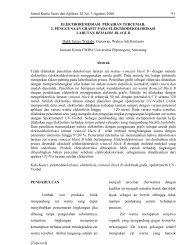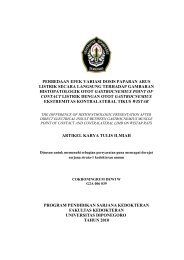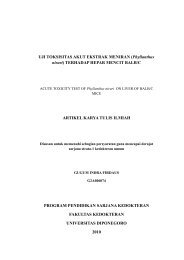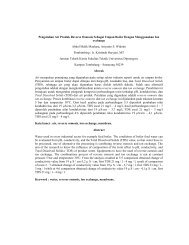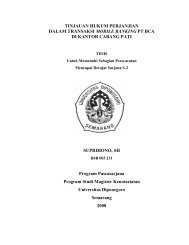Organizing Knowledge in Implementation of Knowledge ...
Organizing Knowledge in Implementation of Knowledge ...
Organizing Knowledge in Implementation of Knowledge ...
Create successful ePaper yourself
Turn your PDF publications into a flip-book with our unique Google optimized e-Paper software.
Proceed<strong>in</strong>gs <strong>of</strong> The 1 st International Conference on Information Systems For Bus<strong>in</strong>ess Competitiveness (ICISBC) 2011<br />
source <strong>of</strong> organizational knowledge. To be able to manage<br />
exist<strong>in</strong>g knowledge with<strong>in</strong> the <strong>in</strong>dividual or <strong>in</strong> the<br />
organization, the Telkom to form a separate unit. The unit is<br />
Assistant Vice President <strong>of</strong> <strong>Knowledge</strong> Management (KM<br />
AVP), <strong>in</strong> order to facilitate the work<strong>in</strong>g process <strong>of</strong> this unit<br />
so it is assisted by the Assistant Vice President <strong>of</strong> human<br />
resources (HR AVP) and ISC Unit.<br />
<strong>Knowledge</strong> management <strong>in</strong> Telkom is aimed to<br />
make members <strong>of</strong> the organization to learn (learn<strong>in</strong>g<br />
organization) through exist<strong>in</strong>g knowledge <strong>in</strong> the<br />
organization as well as from the pr<strong>in</strong>cipals <strong>of</strong> the<br />
organization, because basically work<strong>in</strong>g and learn<strong>in</strong>g<br />
become the same process <strong>in</strong> the organization. Changes occur<br />
very rapid, so each <strong>in</strong>dividual that is with<strong>in</strong> the organization<br />
must also be <strong>in</strong>volved <strong>in</strong> the process <strong>of</strong> knowledge<br />
management, both tacit knowledge (terbat<strong>in</strong>kan) or explicit<br />
(already codified <strong>in</strong>to an article). In situations where<br />
knowledge is owned by Telkom employees who have<br />
different backgrounds, so the exchange is a prerequisite for<br />
the <strong>in</strong>corporation <strong>of</strong> knowledge. Intellectual capital are<br />
generally created through a process <strong>of</strong> <strong>in</strong>corporation <strong>of</strong><br />
knowledge from different parties, therefore, this capital<br />
depend on exchanges between the parties <strong>in</strong>volved.<br />
Sometimes is <strong>in</strong>volves the exchange <strong>of</strong> explicit knowledge<br />
transfer, either owned <strong>in</strong>dividually or collectively.<br />
Accord<strong>in</strong>g to Polanyi (1967) <strong>in</strong> Simon's (1991:126)<br />
that, there's always go<strong>in</strong>g to rema<strong>in</strong> tacit knowledge, so the<br />
process become aware (know<strong>in</strong>g) as important as knowledge<br />
itself. The process <strong>of</strong> knowledge creation is a spiral process<br />
which is the <strong>in</strong>teraction between tacit and explicit<br />
knowledge. The <strong>in</strong>teraction <strong>of</strong> tacit and explicit knowledge<br />
produces new knowledge. Telkom develops their own<br />
model <strong>of</strong> knowledge management which is different from<br />
other.<br />
Research question<br />
The study <strong>of</strong> knowledge management is very<br />
broad, that is why <strong>in</strong> particular, the study can be specifically<br />
identified with the restriction follow<strong>in</strong>g research questions:<br />
How is the process <strong>of</strong> manag<strong>in</strong>g knowledge <strong>in</strong> the<br />
implementation <strong>of</strong> knowledge management at Telkom?<br />
Research Methode<br />
This research use by qualitative methode with case<br />
study approach at Telkom Japati 1st street Bandung.<br />
Technique <strong>of</strong> gather<strong>in</strong>g data uses observation, archived<br />
record, <strong>in</strong>terview, documentation dan physical ware<br />
Literature review<br />
Argumentation theory was once based upon<br />
foundationalism, a theory <strong>of</strong> knowledge (epistemology) <strong>in</strong><br />
the field <strong>of</strong> philosophy. It sought to f<strong>in</strong>d the grounds for<br />
claims <strong>in</strong> the forms (logic) and materials (factual laws) <strong>of</strong> a<br />
universal system <strong>of</strong> knowledge. As argument scholars<br />
gradually rejected the idealism <strong>in</strong> Plato and Kant, and<br />
jettisoned with it the idea that argument premises take their<br />
soundness from formal philosophical systems, the field<br />
broadened. [1] . Karl R. Wallace's sem<strong>in</strong>al essay, "The<br />
Substance <strong>of</strong> Rhetoric: Good Reasons," Quarterly Journal <strong>of</strong><br />
Speech (1963) 44, led many scholars to study "marketplace<br />
argumentation," that is the ord<strong>in</strong>ary arguments <strong>of</strong> ord<strong>in</strong>ary<br />
people. The sem<strong>in</strong>al essay on marketplace argumentation is<br />
Anderson, Ray Lynn, and C. David Mortensen, "Logic and<br />
Marketplace Argumentation." Quarterly Journal <strong>of</strong> Speech<br />
53 (1967): 143-150. [2] . [3] . This l<strong>in</strong>e <strong>of</strong> th<strong>in</strong>k<strong>in</strong>g led to a<br />
natural alliance with late developments <strong>in</strong> the sociology <strong>of</strong><br />
knowledge. [4] . Some scholars drew connections with recent<br />
developments <strong>in</strong> philosophy, namely the pragmatism <strong>of</strong><br />
John Dewey and Richard Rorty. Rorty has called this shift <strong>in</strong><br />
emphasis "the l<strong>in</strong>guistic turn."In this new hybrid approach<br />
argumentation is used with or without empirical evidence to<br />
establish conv<strong>in</strong>c<strong>in</strong>g conclusions about issues which are<br />
moral, scientific, epistemic, or <strong>of</strong> a nature <strong>in</strong> which science<br />
alone cannot answer. Out <strong>of</strong> pragmatism and many<br />
<strong>in</strong>tellectual developments <strong>in</strong> the humanities and social<br />
sciences, "non-philosophical" argumentation theories grew<br />
which located the formal and material grounds <strong>of</strong> arguments<br />
<strong>in</strong> particular <strong>in</strong>tellectual fields. These theories <strong>in</strong>clude<br />
<strong>in</strong>formal logic, social epistemology, ethnomethodology,<br />
speech acts, the sociology <strong>of</strong> knowledge, the sociology <strong>of</strong><br />
science, and social psychology. These new theories are not<br />
non-logical or anti-logical. They f<strong>in</strong>d logical coherence <strong>in</strong><br />
most communities <strong>of</strong> discourse. These theories are thus<br />
<strong>of</strong>ten labeled "sociological" <strong>in</strong> that they focus on the social<br />
grounds <strong>of</strong> knowledge. 1<br />
<strong>Knowledge</strong> management is essentially appear to<br />
answer the question how to manage knowledge<br />
organization, and how to manage it. Awareness to<br />
implement knowledge management <strong>in</strong>to bus<strong>in</strong>ess strategy is<br />
necessary because the company that makes the pro<strong>of</strong> <strong>of</strong><br />
knowledge resources as its ma<strong>in</strong> asset is always able to<br />
encourage more <strong>in</strong>novative company that is geared towards<br />
ownership <strong>of</strong> the company's competitiveness aga<strong>in</strong>st its<br />
competitors.<br />
Accord<strong>in</strong>g Horwitch and Armacost (2002) <strong>in</strong><br />
Sangkala (2007:6-7) that: "knowledge management as the<br />
implementation <strong>of</strong> the creation, capture, transfer, and access<br />
the right <strong>in</strong>formation when needed to make better decisions,<br />
act appropriately, and provide results <strong>in</strong> order to support the<br />
bus<strong>in</strong>ess strategy. While Davidson and Voss (2002) def<strong>in</strong>es<br />
knowledge management as a system that allows companies<br />
to absorb the knowledge, experience and creativity <strong>of</strong> its<br />
staff to improve company performance. Sangkala (2007:7)<br />
then is said also that knowledge management is a process<br />
that provides a way so that companies can identify where<br />
the key <strong>in</strong>tellectual assets are located, captur<strong>in</strong>g the size <strong>of</strong><br />
the relevant <strong>in</strong>tellectual assets to be developed. (Sangkala,<br />
2007:7) <strong>Knowledge</strong> Transfer International (KTI) <strong>in</strong><br />
Sangkala (2007:7) def<strong>in</strong>es knowledge management as a<br />
1 http://www.argumentation theory. Free<br />
encyclopedia.wikipedia mht. Akses 12 Januari 2008.<br />
347


